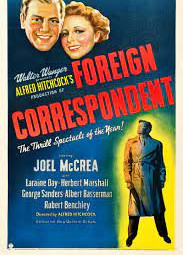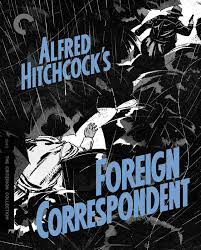I quickly realised that I do not want to discuss just books or even just books that have been made into films. I am interested in most things to do with the Second World War and films are an important part of that. Therefore, I am also going to have a section of the website where other media forms are dealt with.
(As an Amazon Associate I earn from qualifying purchases) Foreign Correspondent is one such example. I discussed the film in my MA Thesis, and this is an edited version of what I wrote and believed twenty years ago, so things might have changed now. The text in italics is from the original thesis.
My Opening Thoughts
‘Since its first development celluloid has been a method of manipulating people’s feelings and beliefs. It has been used as a propaganda tool, especially in times of war, a specific example being Laurence Olivier’s Henry V in 1944. As war is a fervent stimulator of nationalism war films are important in stimulating and reflecting such nationalism.
The Plot

The earliest film considered here; Foreign Correspondent produced in 1940 and directed by Alfred Hitchcock, is a film that initially highlights the use of film as propaganda. It begins with Mr Powers (Harry Davenport), the editor of the Daily Globe, deciding that as: ‘There is a crime happening on that bedevilled continent [Europe], that he needs a crime reporter rather than a foreign correspondent to deal with the story.
His choice is John Jones (Joel McCrea) who uses the pen name Huntley Haverstock, a maverick crime reporter but naïve of the European situation. He sends him to London to interview the Dutch politician Van Meer (Albert Basserman) who is one of the signatories of an international peace agreement. The agreement contains a secret clause that anyone wishing to bring about a war will know.
On his arrival, Haverstock immediately becomes embroiled in the events that are plunging Europe towards war when he witnesses the assassination of Van Meer and takes it upon himself to follow the assassin. He discovers an intricate plot with assassins and spies who have kidnapped Van Meer and replaced him with a doppelganger.
They subsequently assassinate the imposter in the hope that the real Van Meer will reveal the contents of the secret clause. The conspiracy is led by Stephen Fisher (Herbert Marshall) who is using his position as the head of a peace organisation as a front for his real activities. Haverstock is immediately attracted to Fisher’s daughter, Carol (Laraine Day) thus becoming more deeply involved with the unfolding events. Van Meer is eventually rescued unconscious, but it is too late, the war has begun.
The Plot Thickens
Fisher, realising that he has been discovered, takes his daughter, and flees to America. The unconscious Van Meer has been unable to damn Fisher with the evidence against him so Haverstock and his British companion, Scott ffolliot (George Sanders) board the same flying boat as Fisher. On board, they await a cable that will inform them that Van Meer has regained consciousness and has revealed his torture and that Fisher will be arrested when they land. Unfortunately, a German warship shoots them down. They survive, are picked up by a US ship and Haverstock manages to get his story through to Mr Powers.
What I thought back then
This classic Hitchcockian thriller is important because America, the nation that produced it, was not actually at war in 1940 when the film was released. At this time, the prevalent American opinion was that of continued isolationism from another war in Europe.
Against this political backdrop, Foreign Correspondent is notable because of certain stereotypical implications that are represented in the film. The German characters are portrayed as inherently evil and are not averse to torturing and murdering innocent civilians. These anti-German stereotypes are significant because the film highlights the attempt to convince a sceptical nation that the German nation was not to be trusted. This attempt is further highlighted in Foreign Correspondent because it is undoubtedly a call for America to come to the aid of the subjugated Europeans, a fact highlighted most clearly in the final scene as Haverstock is broadcasting from America from a radio station in Britain.
“Hello America, I’ve been watching a part of the world being blown to pieces, a part of the world as nice as Vermont, Ohio, Virginia, California, and Illinois lies ripped up and bleeding like a steer in a slaughterhouse. And I’ve seen things that make the history of the savages read like the Pollyanna legends.”
The strong anti-German sentiment is combined with an implied Anglo-American unity underlined by the sound of bombing threatening to interrupt the broadcast as the scene fades into the Star-Spangled Banner. At first, Haverstock’s character epitomised the American people and their view of the European situation at this time. Initially, he is naïve about the conflict in Europe but becomes deeply embroiled realising that America should be involved militarily.
Just as Haverstock epitomises [the majority of] the American population, Fisher is used to represent the evil deeds of the Nazis. This is symbolised most prominently when Fisher is present at Van Meer’s torture. The captive then calls for someone to come to the aid of Europe and denounces his captors thus:
“I see there is no help, no help for the suffering world. You… You cry peace Fisher. Peace when there was no peace, only war and death. You’re a liar Fisher, a cruel, cruel liar. You can do what you want with me, that’s not important, but you’ll never conquer them, Fisher. Little people everywhere… Lie to them, drive them, whip them, force them into war when the beasts like you will devour each other. The world will belong to the little people.”
Final Thoughts
The other nations of Europe, particularly Britain and Holland [the Netherlands] are characterised as peace-loving innocents evilly threatened by war-mongering Germany. Scott ffolliot is a stereotypical eccentric British aristocrat whilst Haverstock believes that to fit in, he had better wear a bowler hat and carry an umbrella. Haverstock is the archetypal brash, outgoing American character that outfoxes both the evil Germans and the bumbling peace-loving British and Dutch. Above all, the hero, Haverstock, is thoroughly decent and infallible. The paternalistic theme developed here is that the nations of Europe being attacked by Germany were incapable of fending for themselves without help from America. The film is therefore significant because various methods are used to portray a particular message, setting a precedent that continued for more than thirty years.’
The next film considered is 49th Parallel.
BigT
